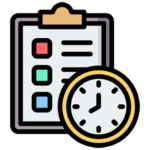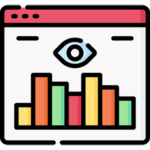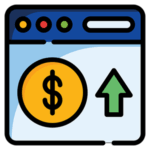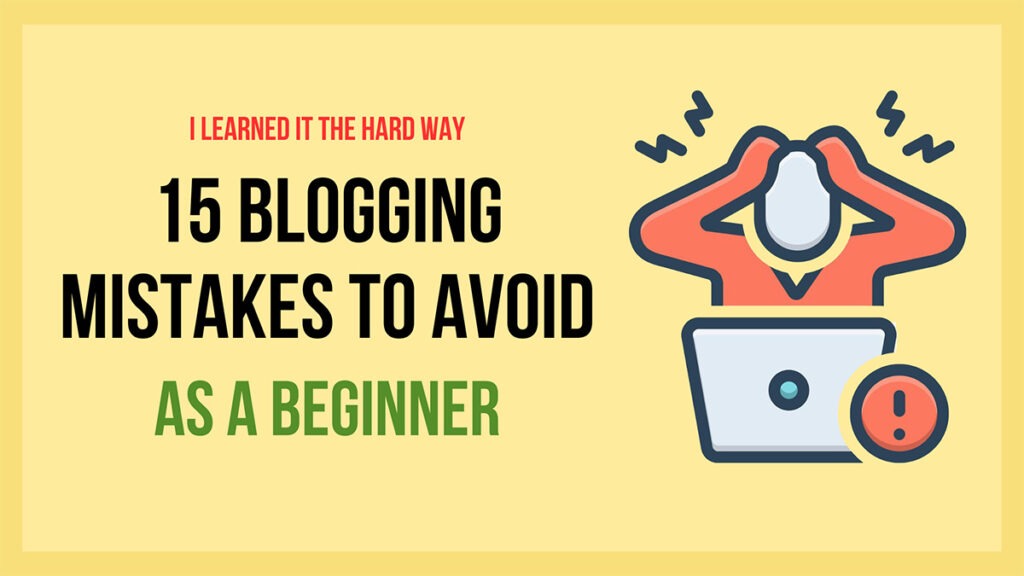So, you’ve decided to start a blog—awesome! You’re full of ideas, excitement, and maybe even a long list of topics you want to write about. But here’s the thing most beginners don’t realize:
Blogging is easy to start… and surprisingly easy to mess up.
We’ve all been there—choosing the wrong platform, stressing over the perfect logo, writing post after post with zero traffic. It’s frustrating. And most of these struggles come from a few common mistakes that nearly every beginner makes.
But the good news? You can avoid them.
In this post, we’re breaking down 15 of the most common blogging mistakes new bloggers make—and more importantly, how you can sidestep them with confidence.
Whether you’re just getting started or feeling stuck already, this guide will help you build a blog that actually grows—without wasting months spinning your wheels.
#1. Not Defining a Clear Niche

When you’re new to blogging, picking a niche can feel limiting. You’ve got a million ideas and don’t want to box yourself in. So you write about travel one week, motivation the next, maybe sprinkle in some recipes or personal thoughts.
At first, it feels freeing. But over time, that lack of focus starts to hurt.
Without a clear niche, your blog has no direction—and no clear audience.
Visitors don’t know what to expect. Google can’t figure out what your site is about. And you? You end up stuck, unsure of what to write next.
Think of your blog like a bookstore. If someone walks in and sees a messy mix of cookbooks, tech reviews, pet care, and self-help… they’ll probably leave confused. But if they see rows of neatly organized content on one specific topic, they’re more likely to stick around—and come back.
A niche doesn’t mean you can never write outside your main topic. It just means you’re building your blog around a specific idea, problem, or audience.
Start by asking yourself:
You don’t need to overthink it. Just pick something focused enough to grow with and flexible enough to evolve later.
Because clarity builds confidence. And confidence attracts readers.
#2. Choosing the Wrong Blogging Platform

This one trips up so many beginners. You Google “how to start a blog,” and boom—you’re bombarded with platforms: WordPress.com, WordPress.org, Wix, Blogger, Medium… it’s overwhelming.
And let’s be real—it’s easy to choose the wrong one.
A lot of beginners start with free platforms like:
They seem simple. No cost, no setup, no fuss. Sounds perfect, right?
Not really.
Because here’s what most people don’t realize until it’s too late:
Free platforms come with serious limits.
You can’t fully customize your site.
You don’t control your content.
You can’t install powerful plugins.
You might even see their ads on your blog.
Worst of all? You’re building your house on rented land.
So what’s the better choice?
WordPress.org—aka self-hosted WordPress.
It’s the go-to platform for serious bloggers for a reason:
Yes, you’ll need to buy a domain and hosting. But that small investment gives you full ownership—and way more potential.
If you’re serious about blogging long-term (or making money from it), skip the free platforms.
Go self-hosted from the start. You’ll thank yourself later.
#3. Ignoring Hosting Quality

So, you’ve chosen self-hosted WordPress—solid move. But now comes another key decision: your hosting provider.
And this is where many beginners take a shortcut. They pick the cheapest host they can find, thinking, “I’ll upgrade later if I need to.”
But here’s the catch: your hosting is the engine behind your blog. If it’s slow, unreliable, or constantly crashing, it doesn’t matter how great your content is—people won’t stick around.
“You only get one chance to make a first impression—and for blogs, that first impression is often load speed.”
A bad host can hurt your user experience, kill your SEO, and stress you out when things go wrong. A good host, on the other hand, makes everything smoother—from loading times to security to support.
Here’s what to look for in a reliable hosting provider:
Sure, better hosting might cost a few extra bucks each month. But in the long run, it saves you far more—in time, traffic, and peace of mind.
So instead of asking, “What’s the cheapest hosting?” try asking, “What’s the best hosting I can afford right now?”
That small mindset shift can make a big difference.
If you’re looking for beginner-friendly options that don’t compromise on speed or support, Hostinger and Hosting.com are two solid choices. They’re affordable, fast, and well-suited for new bloggers who want quality without the overwhelm.
Choose a host that supports your goals—so your blog doesn’t just run, it thrives.
#4. Focusing Too Much on Design, Not Content

Design is fun. Playing with themes, choosing fonts, testing different color combos… it’s easy to spend hours making your blog look just right. And yes, a clean, professional-looking site matters.
But here’s the trap: many beginners spend more time tweaking how their blog looks than actually creating content.
“Design gets attention. Content earns trust.”
Readers don’t come to your blog for the fancy font or the animated buttons—they come for the value you provide.
If your blog looks great but there’s nothing helpful to read, people won’t stick around (and they definitely won’t come back).
Instead of obsessing over design, make sure you’re spending your energy where it really counts: writing blog posts that solve problems, answer questions, or share real value.
Here’s what to prioritize when you’re starting out:
There’s nothing wrong with wanting your blog to look good. But content is what builds trust, attracts traffic, and makes people remember you.
Polish can come later. For now, write first. Design second.
#5. Writing for Everyone (and Pleasing No One)

In the beginning, it feels safer to write for everyone. You want as many people as possible to read your blog, right? So you go broad—talking about motivation, productivity, lifestyle tips, and maybe even sprinkle in some personal stories.
But here’s the hard truth:
When your content tries to appeal to everyone, it usually connects with… no one.
Your blog ends up sounding generic. Like something people skim and forget five seconds later.
Let’s say you’re writing a post titled “How to Be More Productive.” Sounds useful—but it’s vague. Who is it for? A student? A busy parent? A freelancer working from home?
Now imagine the same post, but rewritten as “Productivity Tips That Helped Me Grow My Blog While Working a Full-Time Job.” That’s instantly more relatable. It speaks to a real person with a specific challenge.
The fix? Write like you’re talking to one person. Picture them reading your blog. Think about what they’re struggling with, what they want, and how your content can help them move forward.
You don’t need to pick the perfect reader right away—but the more focused your writing is, the more it will actually resonate.
And that’s the goal. Not just pageviews, but connection.
#6. Not Building an Email List Early

This is probably one of the most common regrets among seasoned bloggers. They wait months—or even years—before setting up an email list.
Why?
Because it doesn’t feel urgent. You’re focused on writing posts, tweaking your design, checking your traffic. Building a list feels like something for later.
But here’s the problem with that mindset:
Every visitor who leaves your site without a trace is a missed opportunity.
People might love your content. They might even plan to come back. But unless you give them a way to stay connected, most of them won’t.
That’s where your email list comes in. It’s the one space you fully own—unlike social media, which can change its algorithm (or vanish) overnight.
Even a tiny list of loyal readers can turn into regular traffic, blog post shares, and early customers if you ever launch a product or recommend tools.
And no, you don’t need a fancy funnel or a 7-part welcome series to start.
Just add a simple opt-in form and offer something small in return—like a free checklist, a quick-start guide, or even just updates when new posts go live.
It doesn’t have to be perfect. It just has to exist.
The longer you wait, the more potential subscribers you’ll miss. Start today—even if it’s messy.
#7. Publishing Without a Plan

When you first start blogging, it’s tempting to just write whatever comes to mind. One week it’s a list of tools you love. The next, a random personal story. Then maybe a post you wrote just to fill the gap.
No judgment—we’ve all done it.
But here’s the truth: Blogging without a plan is like building a house without a blueprint.
It might look okay from the outside, but underneath, there’s no structure to support real growth.
Without a content strategy, your blog feels scattered. Readers don’t know what to expect, and search engines don’t see you as an expert in anything.
To build momentum, you need focus. A simple plan helps you stay consistent, create content with purpose, and attract the right audience.
Here’s what a basic plan might include:
You don’t need to overthink it. You just need a rhythm.
The best part? When you sit down to write, you won’t be staring at a blank page—you’ll already know what needs to be written and why.
Planning brings purpose. Purpose brings progress.
#8. Obsessing Over Traffic, Not Value

Let’s be honest—watching your blog traffic grow can be addictive. You check Google Analytics five times a day, hoping those numbers are climbing. And if they’re not? Instant panic.
Sound familiar?
But here’s the thing: Chasing traffic for the sake of traffic is a trap.
A post that gets 1,000 clicks but doesn’t help anyone… doesn’t help you either. It doesn’t build trust. It doesn’t grow your email list. It doesn’t lead to affiliate clicks or product sales.
Now flip that.
A post that helps just 50 readers, answers their question, and earns their trust? That’s worth more than 5,000 empty visits. Because those 50 people are more likely to stick around, subscribe, and share your content.
There’s nothing wrong with wanting more traffic—it matters, especially long-term. But traffic should be a byproduct of value, not the goal itself.
Ask yourself before hitting publish:
If the answer’s yes, keep going.
If it’s “not really, but I hope it ranks”… you’re writing for algorithms, not people.
And readers can tell.
#9. Copying Others Instead of Finding Your Voice

When you’re just starting out, it’s easy to look at successful bloggers and think, “If I write like them, I’ll succeed too.”
So you mimic their writing style. You follow their post formats. You even copy the way they structure their intros and use certain phrases.
At first, it feels smart—safe, even.
But here’s the problem: you blend in.
And in the blogging world, blending in is the fastest way to be forgotten.
Your favorite bloggers didn’t grow by sounding like someone else. They grew by sounding like themselves. That’s what made them relatable, memorable, and trustworthy.
Finding your own voice doesn’t mean you have to be witty or poetic or edgy. It just means writing like you. Honest. Clear. Human.
If you’re casual in real life, write that way.
If you’re more structured or thoughtful, let that shine through.
If you’ve got a bit of dry humor or bluntness? That’s part of your brand.
It might feel awkward at first, especially if you’re not used to “writing like yourself.” But trust this: your voice is your biggest differentiator.
Readers don’t come back just for tips—they come back for you.
So be real. Be consistent. And give your voice the chance to grow.
#10. Not Learning Basic SEO

Here’s a tough pill: You could write the most helpful, heartfelt, well-researched blog post in the world…
But if no one finds it, it might as well not exist.
That’s where SEO (Search Engine Optimization) comes in. And no, it’s not just for techies or marketers. If you’re a blogger who wants consistent traffic, SEO isn’t optional—it’s essential.
A lot of beginners avoid it because it sounds complicated. Algorithms, keywords, backlinks… yeah, it can feel like a foreign language. But basic SEO really just means writing content in a way that both people and search engines understand.
And the basics? Totally learnable.
Start with simple things like:
You don’t need to master technical SEO right away. You don’t need to chase every new Google update.
But you do need to understand how search works—and how to make your content easier to find.
Because traffic from search engines is different. It’s targeted. It’s long-term. And it doesn’t vanish the moment you stop posting on social media.
The sooner you learn basic SEO, the sooner your content starts working for you—even while you sleep.
#11. Ignoring Mobile Optimization

Here’s something many new bloggers overlook: most people won’t visit your blog on a laptop or desktop.
They’ll find you on their phones—scrolling between meetings, on the couch, or during lunch breaks.
So if your site looks clunky on mobile, loads slowly, or requires too much pinching and zooming… they’re gone.
A poorly optimized mobile site doesn’t just frustrate visitors—it silently kills your growth.
Google now prioritizes mobile usability in its rankings. That means if your site isn’t mobile-friendly, you could be losing both traffic and trust without realizing it.
The fix? Thankfully, it’s simple.
Don’t treat mobile as a “nice-to-have.” For most readers, it’s their only way of experiencing your content.
Make sure it’s a good one.
#12. Expecting Quick Results

Let’s face it—blogging looks easy from the outside. You write some posts, share them online, and boom… traffic, followers, maybe even income.
But the reality? Blogging is a slow burn.
One of the biggest mistakes beginners make is expecting fast results. They post a few articles, check their analytics daily, and start doubting themselves when the numbers don’t jump.
It’s completely normal to feel impatient. You’re putting in real work—and you want to see something happen. But here’s the truth:
Most successful blogs took months—sometimes years—to gain traction.
The early stages are often the hardest. You’re writing into what feels like a void. No comments. No clicks. Just you and your laptop.
But this phase is part of the process.
It’s where you build your voice, sharpen your skills, and start laying the foundation for long-term growth.
If you quit too early, you’ll never get to see what your blog could’ve become.
So set realistic expectations. Commit to consistency. Celebrate small wins—like your first comment, first subscriber, or even just finishing a post on schedule.
Because if you keep showing up, the results will come. Just not overnight.
#13. Not Monetizing Strategically

Most people start a blog with the hope of earning something from it. And there’s nothing wrong with that. But here’s where many beginners stumble:
They either try to monetize too soon, or they do it without a clear plan.
You might see this in the form of random affiliate links dropped into unrelated posts… or display ads slapped on a brand-new blog with barely any traffic.
The result? A poor experience for readers, zero conversions, and frustration for you.
Monetization without strategy often backfires.
Before you think about income, focus on value. Build trust first. Understand your audience’s needs. Give them a reason to stick around.
Then, when you do start monetizing, do it in a way that feels helpful—not pushy.
Some strategic ways to monetize a blog (when the time is right):
The key is alignment. Monetize in ways that naturally fit your blog and genuinely help your readers.
It’s not about slapping price tags on every post.
It’s about creating win-win situations—where your content helps others, and earns you something in return.
#14. Not Promoting Blog Posts Enough

Here’s a hard truth many beginners learn the slow way:
Hitting “publish” is just the beginning.
You might spend hours crafting a great blog post—thoughtful, helpful, well-written—and then… nothing. No traffic. No shares. No comments.
Why? Because no one knows it exists.
If you’re not promoting your content, it’s just sitting in a corner of the internet, collecting dust.
Many bloggers assume that if they keep writing, Google will magically reward them with traffic. And while SEO does matter (a lot), it takes time to kick in. In the early days, you need to put your content in front of people.
That means sharing your posts. Repeatedly. And in the right places.
A few effective ways to promote your blog posts:
The key is consistency. You don’t need to be everywhere. But you do need to be somewhere, consistently sharing your best work.
If you spent 5 hours writing a post, it’s worth spending 30 minutes promoting it.
Otherwise, you’re hiding great content from the people who need it most.
#15. Doing Everything Alone (and Burning Out)

In the early days of blogging, you wear all the hats.
Writer. Editor. Designer. SEO learner. Social media manager.
And maybe even your own tech support when something breaks.
At first, it feels manageable—even exciting. You’re learning new skills and building something from scratch. But over time? It starts to pile up. And if you’re not careful, that initial spark turns into stress.
Trying to do everything alone is one of the fastest paths to burnout.
The pressure to keep up—posting regularly, growing traffic, improving design, learning SEO—can leave you feeling overwhelmed and stuck.
But here’s the thing: you don’t have to do it all yourself.
It’s okay to:
Blogging is a long game. The goal isn’t to hustle till you hate it.
The goal is to build something meaningful—and sustainable.
So pace yourself. Focus on progress, not perfection. And remember: asking for help (or simplifying your workload) doesn’t make you less committed—it makes you smarter.
Conclusion: Mistakes Are Inevitable—Quitting Doesn’t Have to Be
If you’ve recognized yourself in a few of these mistakes—don’t worry. That just means you’re human.
Every successful blogger you admire? They’ve made most (if not all) of these errors at some point. What sets them apart isn’t perfection. It’s persistence.
Blogging is a skill. And like any skill, you get better by doing—not by waiting to get everything right.
The goal isn’t to avoid every single mistake. It’s to learn faster, course-correct sooner, and keep moving forward even when it feels slow.
So take a deep breath. Refocus. Fix what you can, one step at a time.
And most importantly—don’t stop writing.
You’ve got something valuable to share. Someone out there needs what you’re creating. Your job is to show up, stay curious, and keep growing.


